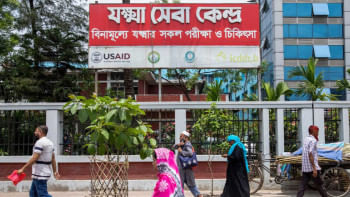Market syndicates commonplace for legal loopholes

Market syndicates, which frequently make headlines for abrupt price hikes, have been almost institutionalised due to malpractices in the formulation of legal frameworks, said the chief adviser's special envoy for international affairs today.
"In some cases, anticompetitive clauses can be found inserted within existing laws. So that this syndicate becomes almost legal, lawful and institutional," said the envoy, Lutfey Siddiqi.
"We need to address these issues through reforms," he said at a discussion, titled "LDC Graduation: Impacts on Agro Sector Export Diversification and the Way Forward".
The event was jointly organised by the Economic Reporters Forum (ERF) and Bangladesh Agrochemical Manufacturers Association on the former's premises in Dhaka.
"Wherever I look, whatever I see, one word keeps coming up repeatedly -- syndicate. In places where we are supposed to have market forces, competition and fair play, only the word syndicate appears," Siddiqi said.
And along with syndicate, the word nexus also comes up. If syndicates exist among businesses owners, these turn into nexuses through the inclusion of public servants, he added.
When such nexuses and syndicates exist, the market does not function as expected within a regulatory environment, where market forces should have naturally determined the outcome, he said.
The same template keeps appearing in every sector and industry, said Siddiqi.
The interim government has been closely observing the rising prices of essential commodities and air tickets, he said, adding, "We are working on controlling it. I believe the work is progressing as planned."
"We must achieve LDC graduation. Be it today or tomorrow, it is inevitable," he said.
"We currently enjoy duty-free access to the EU market. They ask us, 'We are giving you so many advantages, so why is your tax-to-GDP ratio so low? Why is private investment so low?'," said Siddiqi.
"Instead of solely focusing on LDC graduation, we need to think about 'One Bangladesh' -- how we can advance as a nation. We must consider what the government, politicians, and businesses can and must do to drive progress," he said.
"We have the potential to become a business hub, something that India and China cannot achieve in the same way. This is an opportunity we must capitalise on," he said.
"Additionally, we can establish processing centres, particularly for halal meat, and take up people-processing initiatives. We can enhance the skills of our workforce and send more skilled professionals abroad," said Siddiqi.
The interim government has noticed that state bodies do not facilitate the ease of doing business. Ministries just forward letters among themselves, creating bureaucratic delays, he said.
This has prompted the interim government to form an inter-ministerial committee to identify and address the bottlenecks. By next month, the "National Single Window" will be launched, he added.
Initiated by the National Board of Revenue (NBR), the "National Single Window" is a simplified platform for global trade aimed at easing business processes by reducing procedural time.
The single-entry point will deliver a user-friendly electronic system that streamlines and automates procedures for international trade-related permits, licenses, certificates, and customs declarations.
Shafiqul Alam, press secretary at the Chief Adviser's Office, said Chief Adviser to the interim government Prof Muhammad Yunus wants to create a lot of jobs and aims to turn Bangladesh into a manufacturing hub.
"There is a subtle trade war going on among various countries around the world and efforts are underway to ensure that we can take advantage of it," he said.
KSM Mostafizur Rahman, president of Bangladesh Agrochemical Manufacturers Association, and ERF President Doulot Akter Mala and Secretary Abul Kashem also spoke.

 For all latest news, follow The Daily Star's Google News channel.
For all latest news, follow The Daily Star's Google News channel. 



Comments